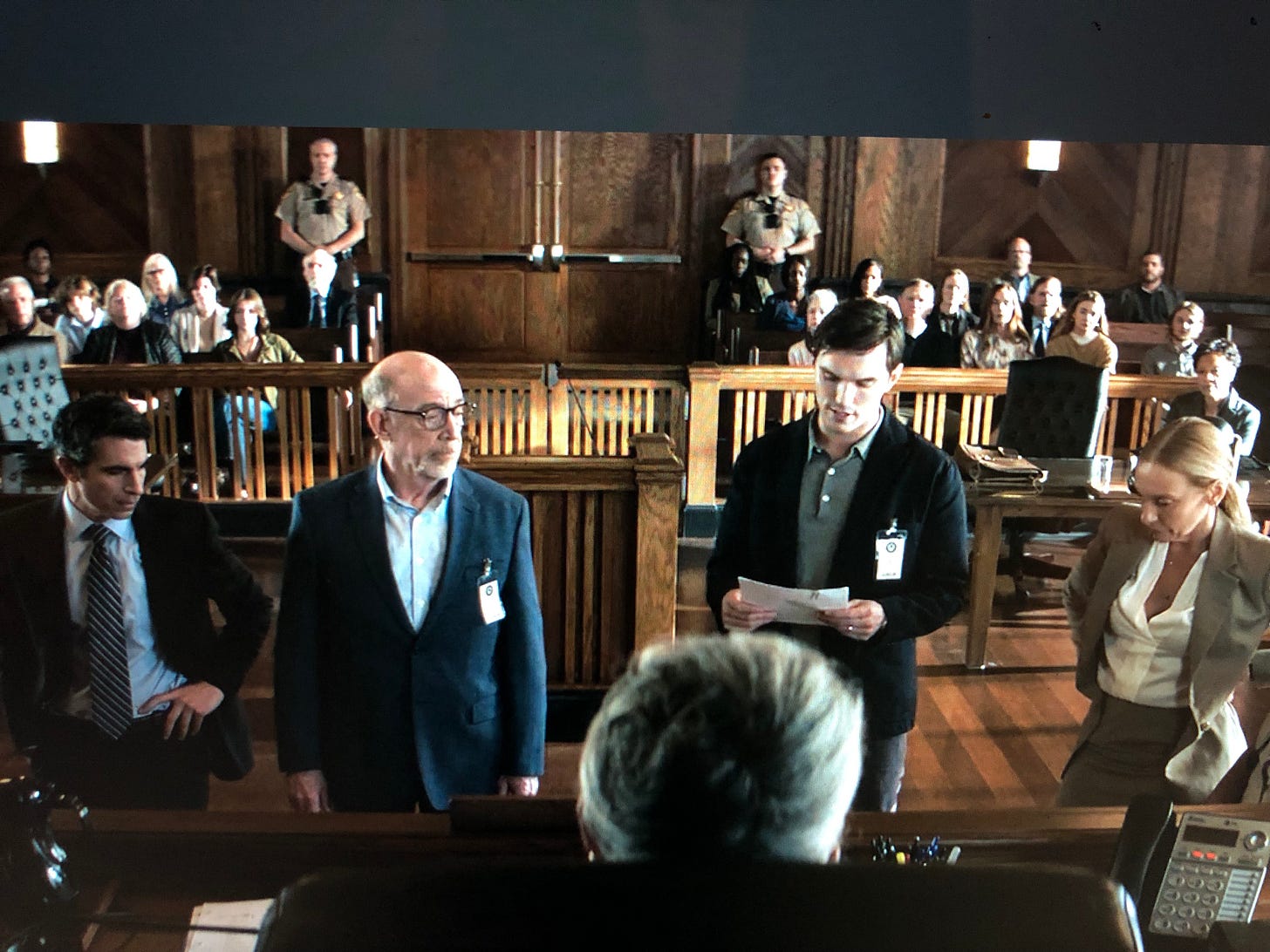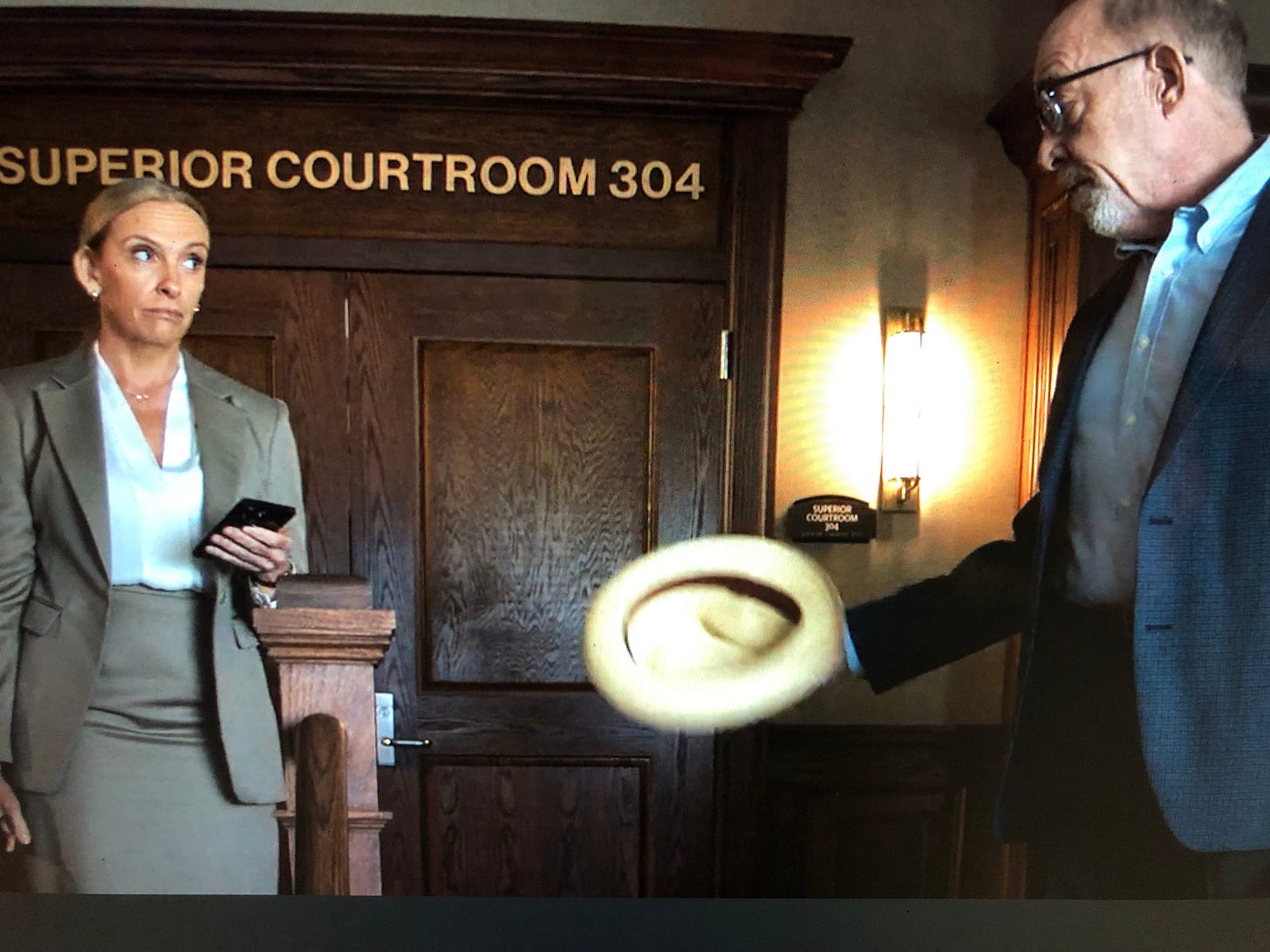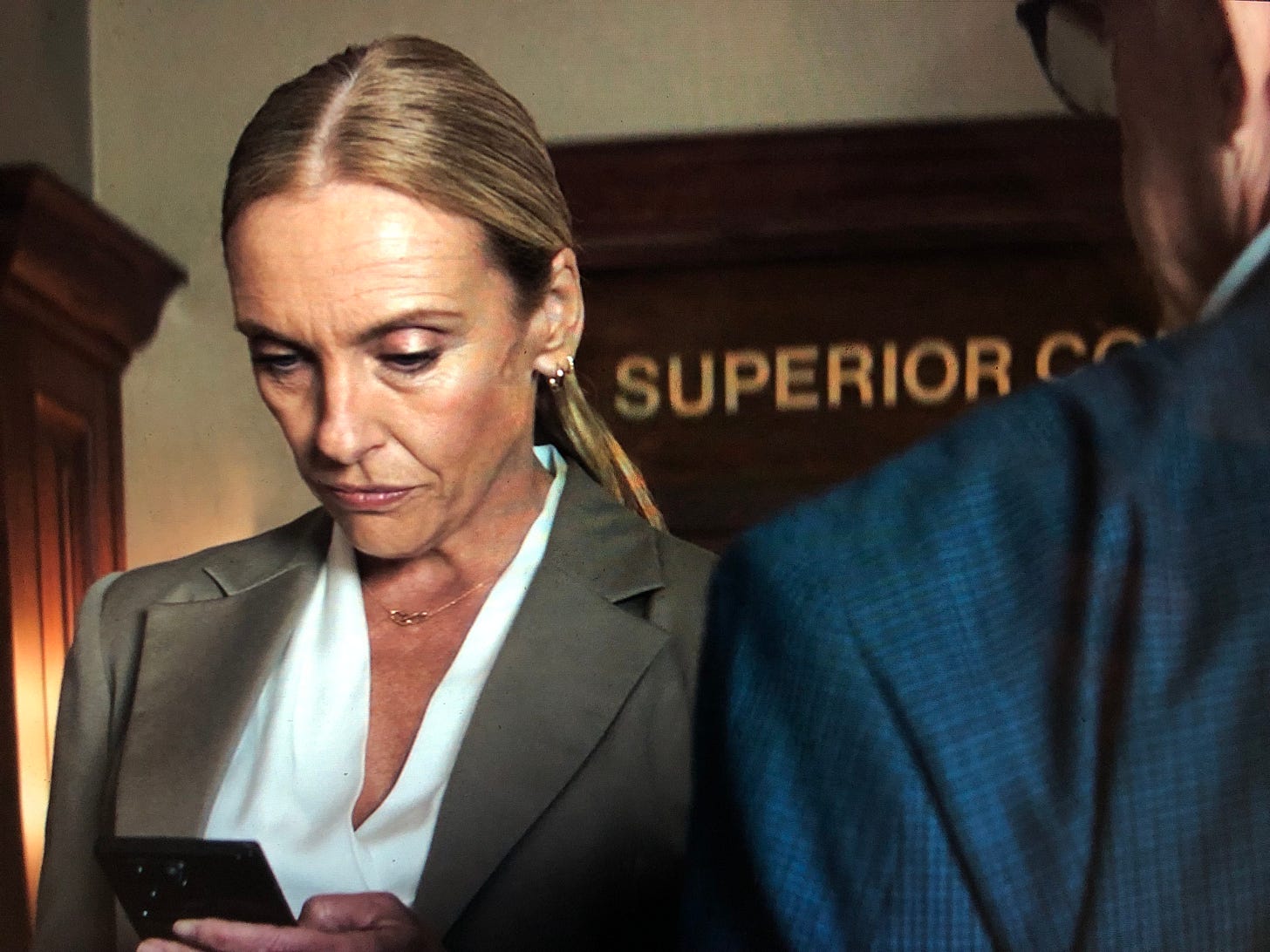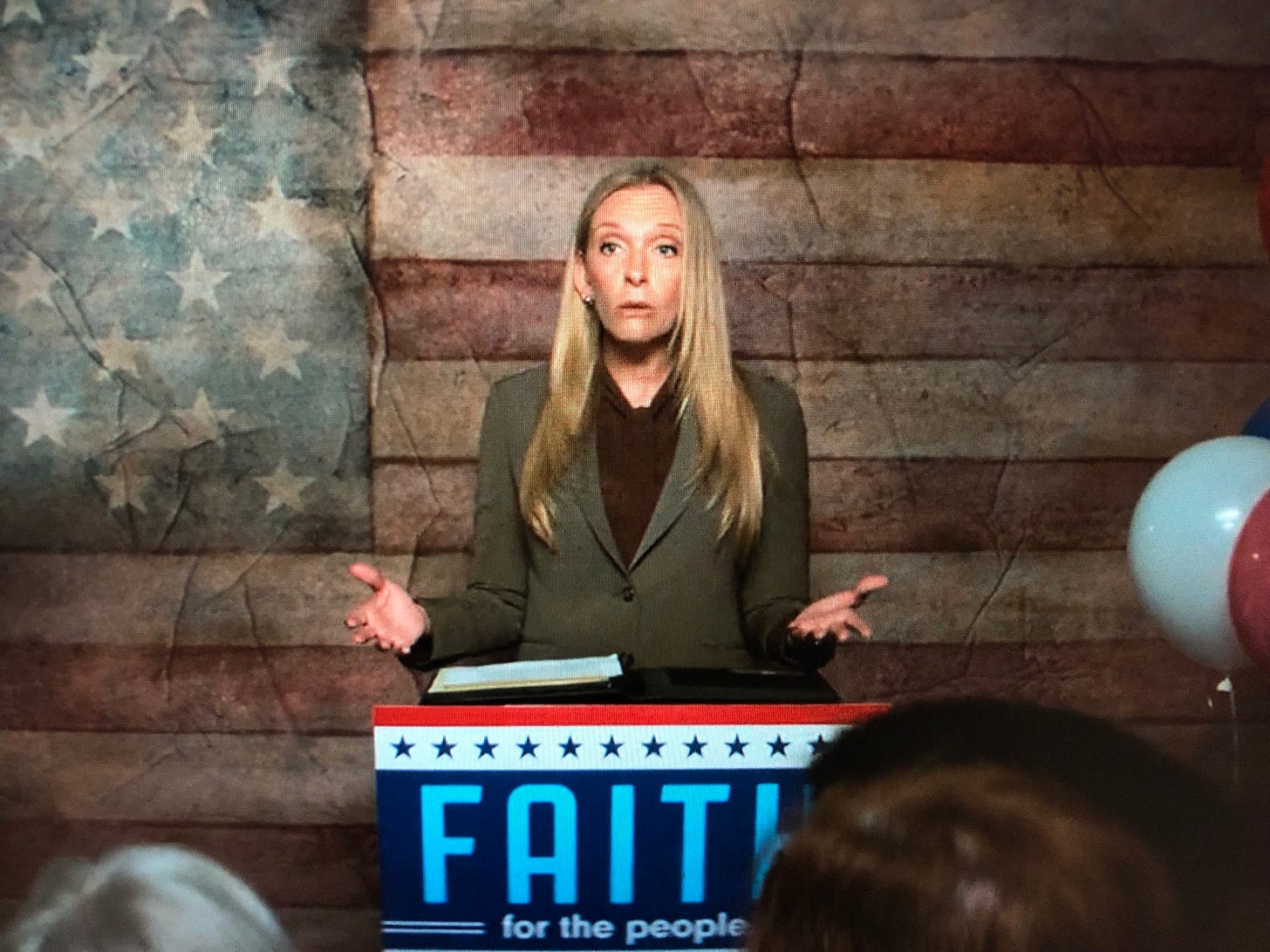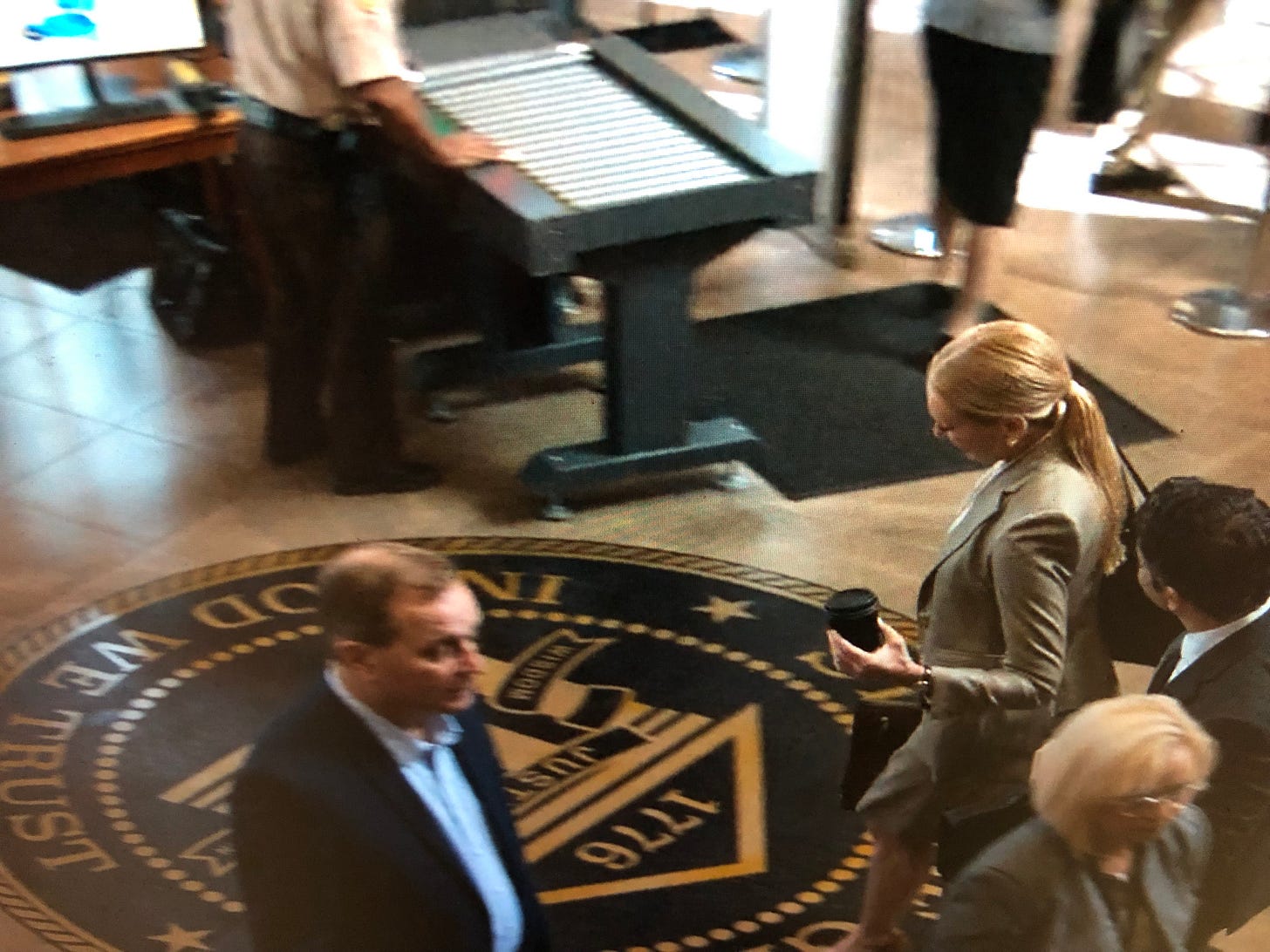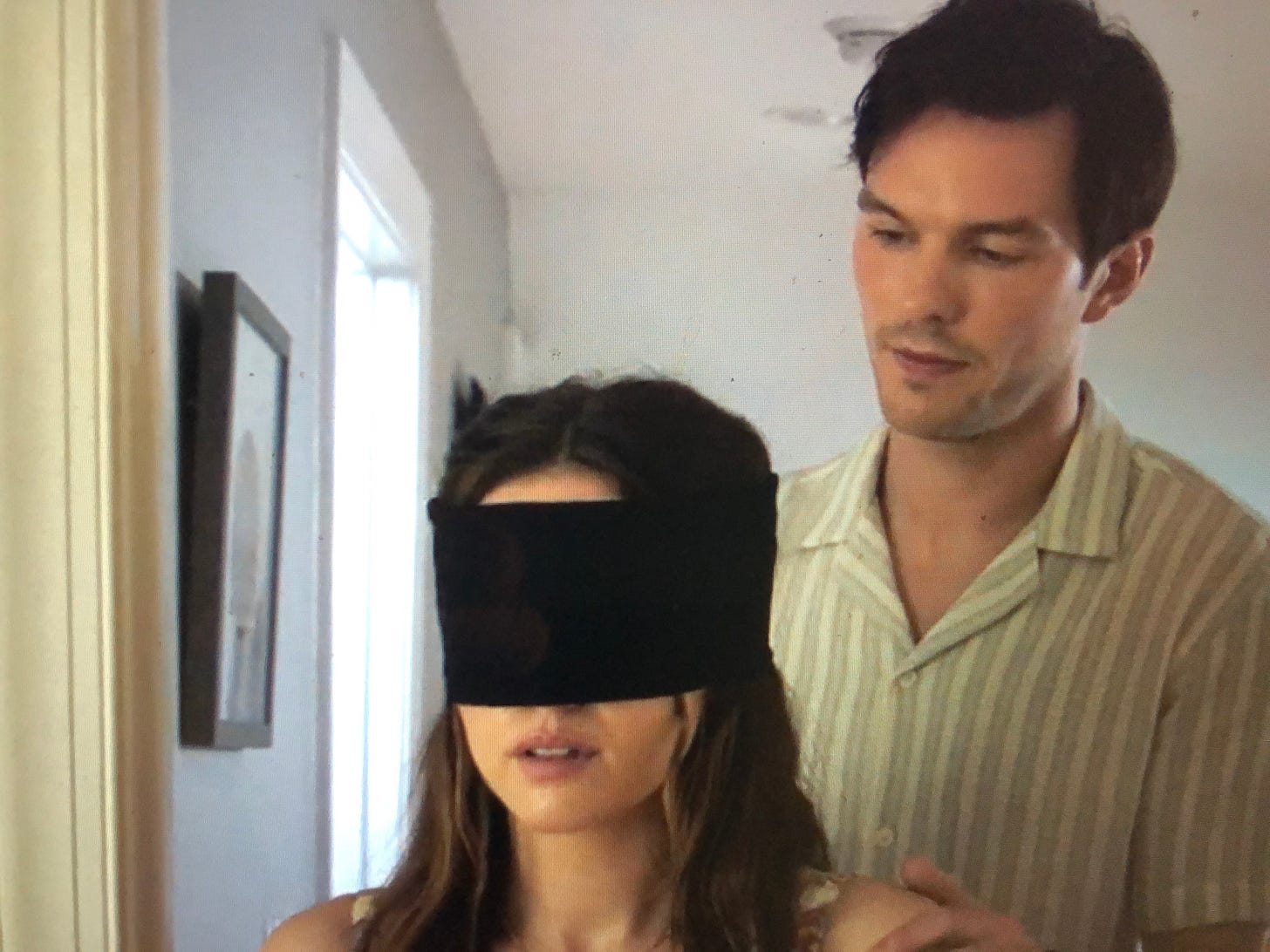Juror #2: Review (12 Angry Average Citizens)
When truth, law and justice fail "In God We Trust"
The subtitle should read: when truth, law and justice fall to anything less than faith in God, they serve no one but the atomized, nuclear self. Now, that’s a big statement. I hope more people see this movie but doubt they will. So let me unpack that.
Clint Eastwood may be one of the best American storytellers, telling stories about true things in American culture that otherwise aren’t sexy enough or shiny enough to talk about. Things that are too taboo to have honest conversations about, but still reverberate, their sources of conflict buried beneath the exterior discourses of the American soul.
Juror #2 opens with the protagonist, named Justin, played by Nicholas Holt (maybe the most overlooked and underrated actor of the year), leading his blindfolded wife into a newly decorated baby bedroom. Then he’s selected for jury duty. His wife is expecting and due soon. Justin is invested and taking his new role with sincerity and hope and he doesn’t want to miss any important moments along the way. The couple already had two miscarriages. They joke about getting out of the civic duty and Justin charmingly makes light of the situation. His pregnant wife laughs and absent-mindedly turns the lights out on him before heading upstairs to bed.
I won’t explicate the whole movie, but the opening scenes of this movie are so loaded with symbolic behaviors and actions even while seeming mundane and unsexy. There’s no chase sequence or striptease. A young pregnant woman and her husband in their house, a letter in the mail for jury duty, and nobody’s misbehaving or creating tension. It’s almost too cute. Then, we catch some glimpses of the public defender (Chris Messina) and the prosecutor (Toni Collette) for the upcoming case—fast dialogue about the plea bargain, their roles, the prosecutor’s election hinging on this case. Some external plot builds, but this opening image foreshadows and emblematizes the film unexpectedly. This is not a story about technology or media or persona-making or body image or dystopian surveillance. But still, the phone is a powerful symbol.
The reality of the phone is acknowledged, and it is a powerful symbol, albeit a subtle one. It hardly appears three or four times, prominently. A casual watcher might say this foreshadows the later scene where Toni Collette’s prosecutor later does a revealing Google search, but there’s layers of character and motives beneath that.
The phone symbolizes self-image, projection and desire for power and identity. For the prosecutor, it is an extension of her identity and her desire to become something, to achieve a career ambition, to find meaning. Justin’s picks up the prosecutor’s phone after she drops it getting out of her car. He races to give it to her—an act of kindness. It is meaningless to the plot, but this sequence’s act of kindness casts the dark shadow of doubt over the film and its themes of the impossibility of justice, and the limitation of the law’s promise of balancing the scales.
I don’t want to say too much, because the film is masterfully crafted, edited and tight. It’s a glimpse of American life under a sunny, blue Georgia sky and its community. Realism with the shadow cast not by some Eastern European count’s hand or captured desire, but by the unfolding of the plot itself, interlocking several private lives within a community and a system that promises justice but fails to execute on its promise—for reasons that we can philosophize about after the film concludes: have people become too selfish? Have they lost their faith in God? Hase everyone lost trust in the system—except for the people who needed it the most?
Nicolas Holt’s Justin has also come out the other side of AA and reached something like a second chance in his life. He’s struggled and reached a new level of self-awareness and responsibility. When we first see him with the jurors in their room, it is a scene reminiscent of Twelve Angry Men: a delightful meeting of strangers first at ease, then packed with tension, updated to fit the demographic of a twenty-first century American jury.
Justin’s secret incentivizes him to have the highest conscience of the whole jaded jury in an intriguing, self-contradicting plot engine. He annoyingly becomes the voice of light and reason among the 12 angry average citizens, and his persistence on finding the truth (debatably selfishly motivated, or sincere) creates tension among the multitude of jurors, but not without his own dark secret.
Justin can ignore his drink—and his phone—while weighing his past with the present. We can only imagine the meaning of the coin, his AA experience, the strong urge to take a sip of that drink, the loss of his unborn child, and anything else on his mind in the bar.
Just like we can only imagine what the prosecutor is so importantly wrapped up in on her phone while expelled jury member Harold (a surprisingly subtle but emotional role played by J.K. Simmons) tries to talk to her like two good-faith citizens outside the courtroom with nothing at stake except their own two egos.
Which brings this other theme into the movie without directly ever mentioning it: a loss of faith. We only know the prosecutor’s name is Faith because she’s running for election, and her name appears. It appears on election signs and promotional posters, but often when we see it like this in the film it is quickly obscured or covered up by a head or an object getting in the way. It’s possible to know that this prosecutor’s name is Faith, but it’s rarely mentioned. She’s running to win an election at the moment, and that election hinges on this case and the prosecuted man admitting to something that he—and we, the movie-viewing audience, and the jury—come strongly to believe he didn’t do.
What’s interesting is how the whole process is so readily dismissed by the jury, who simply want to go home and get back to their lives. The power of this movie rests in its ability to access a wide range of characters tied to this process of justice and law, and their reluctance to engage with it in good faith. They are too self-interested and prejudgment about the man accused of murder, too ready to be certain beyond a reasonable doubt. All this prejudgment accumulates and compounds. It begins even before the information reaches the lawyers. The man accused of murder had also turned a new page in his life, formerly a low-life gang member, as the story indicates.
Yet we, the audience, like the jury, can only imagine his past, his life history of crime, and even his recent past that led him to turn a page, become a new man, then get involved in the actions that led him to be on trial for murder again.
The jurors’ self-involvement, their encapsulation in their own private communities and autopods and phones and cul-de-sacs and whatever else is going on in their lives—this has a ripple effect, and it is the theme that is the lifeblood of this story and its characters.
Yet the roles of judge, prosecutor, and public defender all factor into the hierarchy of law and justice. Like the jurors, their good-faith acting is discouraged, good intentions are limited by the strictures, laws and codes of justice.
The public defender has the most thankless, most overworked, most underpaid role in this story, perhaps in the world of the law. Sure, sometimes, as he acknowledges, his default role is to make the best of a bad situation for his defendants, who may or may not be guilty of the crimes they are prosecuted for.
His conversations with the prosecutor and their honesty—his sincerity foiled with her ambition—and the backstories of two friends coming from the same school with the same professor, whose slogan “justice is truth in action,” which they both inherited but lost the meaning of—going down two separate paths—directs the light of this movie up the scales of the imperfect system towards the high authority of the judge.
Ultimately, the scales of justice rest before no one else but God, yet functionally they rest in the hands of the flesh-and-blood, law-creating human beings who maintain this system with words, with language and codes, with customs and laws, λόγος, the divine meaning that the emblem on the floor of the courthouse declares: IN GOD WE TRUST.
I can’t say too much about this film without revealing too much and I recommend all people see it themselves. In a year where gender roles factor so largely into most of the movies getting attention at the moment, from Nosferatu to Emilia Perez, Anora to Babygirl, Juror #2 as yet another Clint Eastwood flick surely doesn’t have a lot of sex appeal. Yet I never felt bored, and I couldn’t look away. The visuals rest in the eyes of the characters the actors inhabit. In their voices, their doubts, their certainties, their bodies, sometimes bordering on breaking down in tears—the gang tattooed defendant accused of murder, or the retired juror played by J.K. Simmons.
And there is certainly a bigger discussion audiences could dig into involving gender roles and how they’ve changed “the system” of the law, with the prosecutor and judge both being women against the accused and the public defender both being men—along with juror #2 himself, caught between the desire to protect his family and act with a clear conscience as a civilian. This surely echoes reality with some darker and more difficult-to-discuss implications that require that difficult dance around sexist projection and the actual nuances in behavior, ambition, and aggression among women and men—and how these traits manifest differently.
The jury, too, gets diverse representation, visibly showcasing what a Georgia jury might look like, across age, gender, race and ethnic background, roles and stages in life. Whether what’s attributed to these characters is realistic or stereotypical, prejudiced or probabilistic, is up for the audience to decide. If 12 Angry Men has been dated by its demographic of jurors, this film can at least be considered its 21st century successor.
I have to catch up on the Clint Eastwood directorial canon. I’m hardly if ever disappointed with his directorial choices and directions to the extent that they deliver thematic premises that touch hard-to-talk about, beneath-the-surface themes in the American psyche and culture. And they do so with such economic simplicity that does not rely on spectacle or image, but tightly and expertly edited pace and story that doesn’t miss a beat.
There’s a gifted insight the 94-year-old director has into the American psyche and its cultural currents. Say what you want about the generations, the eldest among us have lived through them all.
Sure, the Nosferatus and the Mad Maxes and Babygirls are exciting and edgy, but to anyone who enjoys paying attention or wants to do more of it, I can’t recommend Juror #2 more.
Thanks for reading. This is my rough draft of this movie review.
The images are screenshots I hope this comply with fair use. The movie is currently available on HBO Max.
I’m posting the rough version of this review here before I repost it to my main newsletter, Aerations which I renamed from Explorations. I’ll still write about places, travel, geography and culture on there, and consider this a cross-post on culture and the imagination.
ARW




